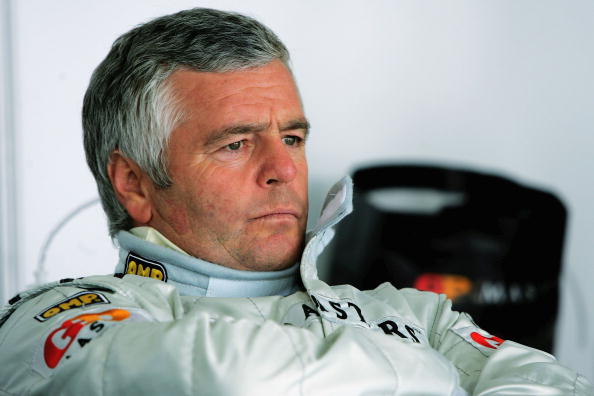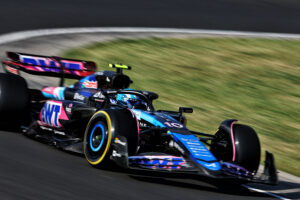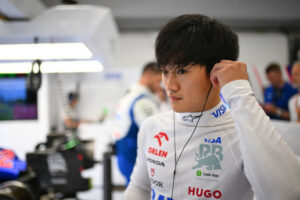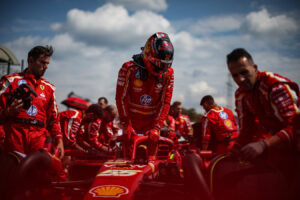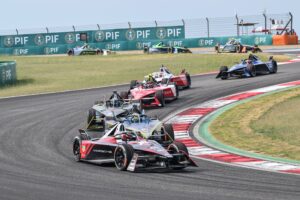LWOS takes a look back over the career of former Formula 1 driver Derek Warwick, who also took the time to speak to us about his career and his thoughts on F1 today.
Many aficionados of Grand Prix racing regard Englishman Derek Warwick as one of the greatest Formula 1 drivers to never adorn the podium’s top step. In an F1 career that spanned over ten years, Warwick drove for some of the most prestigious teams of the time, but never at the right time, with cars that never matched his considerable talents.
Superstox to F1
Originally making his name in Superstox [a single-seater form of stockcar racing] in the early 1970s, Warwick was stepping onto the stones that reach Formula 1 soon afterwards, winning the British Formula Three Championship in 1978. After forays into European Formulas Three and Two, his drives in the latter for the Toleman team saw him promoted into their Formula 1 team for the 1981 season. After a difficult initial two years, 1983 would see Warwick make significant progress, scoring points in the final four races of the year. His performances gained the attention of Renault, who signed him for 1984, the year in which he scored all of his four podium finishes. The French team’s powers were becoming more modest. 1985 would be a disappointment, particularly after narrowly missing out on a drive with Williams, which would go to Nigel Mansell.
Brabham to Arrows
1986 would see Derek Warwick out of a drive, coming agonisingly close to a seat with Lotus, but his drive with the team was vetoed by his prospective team-mate, Ayrton Senna. The Brazilian was said to have blocked the move because of his concerns that the team were not able to realistically support two drivers of a higher calibre, which Senna believed Warwick was. He would, however, be eventually hired by Brabham, replacing the late Elio de Angelis, who died in a practice crash in France. Warwick was said to have been given the drive by Brabham boss and future F1 supremo Bernie Ecclestone not just for his capability, but because Warwick was the only out-of-work driver not to call Ecclestone touting for the seat immediately after hearing of de Angelis’ death.
Three years with Arrows would follow, paired with America’s Eddie Cheever. It was the most consistent and successful period of Arrows’ history, with Warwick earning fourteen points finishes during that time. Though past their best, Lotus would eventually give Warwick a seat in 1990. But the uncompetitive Lamborghini V12 engine would see Warwick score only three points all year. That season is perhaps best known for his spectacular crash on lap one of the Italian Grand Prix. Just two races later at Jerez, Warwick again showed considerable bravery by qualifying an impressive 10th, moments after witnessing a horrifying crash involving team-mate Martin Donnelly, a crash which ended the Irishman’s career.
Tragedy & Le Mans
Personal tragedy would befall Warwick a year later, with the death of his brother Paul in a Formula 3000 crash at Oulton Park. Paul would become the only posthumous F3000 Champion, and admirably, Derek decided to continue racing. The decision would be another act of courage, and the reward would be victory in the 1992 Le Mans 24 Hours for Peugeot. He was given the honour of being the driver in the car at the finish by Peugeot boss Jean Todt. The success was rounded off by Peugeot’s World Sportscar Championship victory the same year, alongside Yannick Dalmas.
A return to F1 for one final year would follow in 1993, returning to Arrows [now rebranded Footwork], scoring four points. Warwick would partake in other forms of racing in the following years, with forays in the British Touring Car Championship, and the short-lived but popular Grand Prix Masters series. Today, Warwick takes life a little more slowly, as a successful businessman in Jersey.
An interview with Derek Warwick
LWOS: You began your career as a stockcar driver and that was your ambition, not Formula 1. When you did reach Formula 1, did your background in stockcars make you feel different in comparison to the other F1 drivers, and if so, was that something you enjoyed?
DW: I am very, very proud of what I did in Superstox. Yes, my ambition was to race Superstox and become World Champion, which I did in 1973. Regarding F1, I never hid the fact that I did Superstox. As I said I was very proud when I got to F1, I was accepted for my achievements in Formula Ford, F3 and F2.
LWOS: Many experts and fans alike have regarded you as one of the greatest F1 drivers to never win a race. Which races would you regard as your best?
DW: This is almost impossible to answer. The races you almost won or finished second were quite often the easiest races because you were in one of the best cars. Winning the Superstox World Championship and Le Mans were probably my favourite and best.
LWOS: Do you ever wonder ‘what if?’ regarding narrowly missing out on driving for Williams, and being teammates with Ayrton Senna? Do you think you would have been able to match Senna?
DW: I never think of ‘what if’ and I never look back. I sometimes think about it when I’m asked the question, but it 100% does not bother me. Regarding Senna, I have never been frightened of my teammates, in general, I was always quicker and scored more points. We all know now that Senna was special so it would have been a great challenge for me. Would I have been able to match him? I think yes but of course, we will never know.
LWOS: In the 1990 season, you of course had a memorable and frightening crash at Monza and then witnessed your team-mate Martin Donnelly’s horrific impact in Jerez, and yet yourself and others continued to race. Do you think drivers in your era were mentally stronger than today?
DW: 100% we were stronger mentally than today, only because of the era we raced in, when drivers die around you including my little brother. You had to be mentally tough otherwise you would not have survived. Are the guys tough or tougher today? Maybe they are but in a different way, they have to cope with such different technology, a steering wheel with something like 300 settings. Plus the biggest problem – social media. I have heard many drivers say that it’s social media that they find most difficult to deal with.
LWOS: In 1998, you more than ably stood in for Martin Brundle in the ITV F1 commentary box in Canada alongside the great Murray Walker. Did you enjoy this, and were you ever offered any other roles in media relating to covering Formula 1?
DW: I did enjoy it, but at that time it wasn’t very well-paid and I was still building my Group. So I needed to spend time here in Jersey, the UK and Australia. I could have done more but like I’ve said I was too busy. Anyway, Martin is at least 100 times better than I was!
LWOS: Would you change anything about Formula 1 as it is right now?
DW: This is a loaded question, but yes I would like the cars to be much lighter. They are way too heavy and cumbersome. They need to be just a little noisier, smaller, more horsepower, lighter and take some of the driver aids away. But, I’m loving watching F1, it’s the greatest cars with the greatest drivers.
Our thanks to Derek Warwick.


